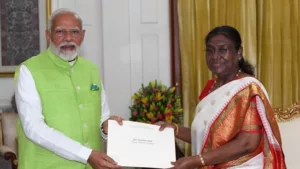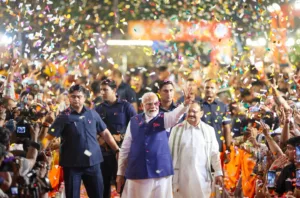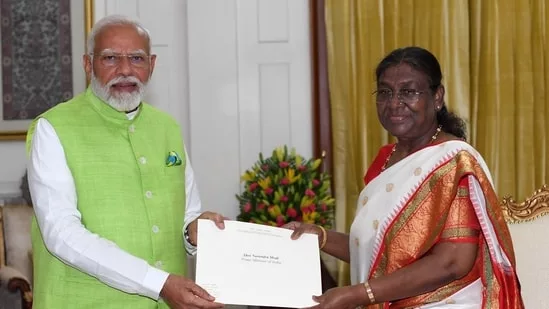
On a historic day for Indian politics, the 17th Lok Sabha dissolved, marking the end of its term and paving the way for new elections. With this dissolution, Prime Minister Narendra Modi tendered his resignation, signaling the end of his second term. However, the political landscape is abuzz with speculation and anticipation as Narendra Modi is poised to take the oath of office for a third time, continuing his leadership in what has been one of the most transformative periods in India’s modern history.
The Journey of the 17th Lok Sabha
The 17th Lok Sabha, constituted after the general elections in 2019, saw the Bharatiya Janata Party (BJP) under Narendra Modi secure a decisive mandate. This period was marked by significant legislative activity, socio-economic reforms, and robust foreign policy initiatives. Key legislation such as the abrogation of Article 370, the Citizenship Amendment Act (CAA), and various economic policies underscored the tenure of this Lok Sabha.
Legislative Achievements
- Abrogation of Article 370: One of the most significant and controversial moves was the abrogation of Article 370, which granted special status to the erstwhile state of Jammu and Kashmir. This decision was lauded by supporters as a step towards national integration but faced severe criticism and protests from various quarters both within and outside the country.
- Citizenship Amendment Act (CAA): The CAA aimed to provide a pathway to Indian citizenship for persecuted minorities from neighboring countries. The legislation sparked nationwide protests and debates about its implications on India’s secular fabric.
- Economic Reforms: The government introduced various economic measures aimed at boosting growth, improving the ease of doing business, and attracting foreign investment. Initiatives such as the production-linked incentive (PLI) scheme and measures to enhance the startup ecosystem were noteworthy.
- Farm Laws: The introduction and subsequent repeal of the farm laws were among the most contentious issues during the 17th Lok Sabha. The laws, intended to reform agricultural markets, faced staunch opposition from farmers leading to prolonged protests and eventual repeal.
- COVID-19 Response: The government’s handling of the COVID-19 pandemic, including the nationwide lockdown, vaccination drive, and economic stimulus packages, were central to its tenure. The pandemic posed unprecedented challenges, and the government’s response received mixed reviews.
Narendra Modi’s Leadership
Prime Minister Narendra Modi’s leadership has been characterized by his decisive and often bold policy decisions. His tenure saw a mix of high praise for developmental initiatives and criticism for handling contentious issues.
Development Initiatives
- Digital India: Modi’s government significantly pushed the Digital India initiative, aiming to transform the country into a digitally empowered society. From improving digital infrastructure to promoting digital literacy, these efforts have had a far-reaching impact.
- Make in India: Launched to transform India into a global manufacturing hub, the Make in India campaign focused on job creation and skill enhancement, aiming to attract foreign direct investment (FDI) and improve manufacturing capabilities.
- Swachh Bharat Abhiyan: The Swachh Bharat mission aimed at making India open defecation-free and improving overall sanitation and hygiene. The campaign received widespread support and marked a significant cultural shift towards cleanliness.
- Ujjwala Yojana: Under the Pradhan Mantri Ujjwala Yojana, millions of LPG connections were provided to women from below-poverty-line households, aiming to reduce health hazards associated with traditional cooking methods.
Modi’s Resignation and the Dissolution of the 17th Lok Sabha
The dissolution of the 17th Lok Sabha is a routine constitutional process marking the end of its term and initiating the electoral process for the next Lok Sabha. Narendra Modi’s resignation, in this context, is a formality, signaling the end of his current tenure.
Constitutional Procedure
The dissolution of the Lok Sabha and the resignation of the Prime Minister are part of the democratic process. As the 17th Lok Sabha completes its term, the President of India dissolves the house, and the Prime Minister resigns, paving the way for the formation of a new government post-elections.
Anticipation of Modi’s Third Term
As the nation prepares for the next general elections, there is widespread speculation about Narendra Modi’s potential third term as Prime Minister. If the BJP secures another majority, Modi is expected to take the oath of office once again.

The Road Ahead
- Election Campaigns: The upcoming election campaigns are expected to be intense, with the BJP highlighting its achievements and the opposition critiquing the government’s performance on various fronts.
- Public Sentiment: Public sentiment will play a crucial role in determining the election outcome. Key issues likely to influence voters include economic performance, handling of the pandemic, national security, and social policies.
- Challenges and Opportunities: If re-elected, Modi will face significant challenges, including economic recovery post-pandemic, job creation, and addressing social issues. However, it also presents opportunities to build on the foundation laid during his previous terms.
Key Dates and the Electoral Timeline
The Election Commission of India will announce the detailed schedule for the general elections, including dates for voting and counting of votes. If the BJP wins the mandate, Narendra Modi’s swearing-in ceremony is expected to be a grand event, symbolizing continuity and a new chapter in Indian politics.
Conclusion
The dissolution of the 17th Lok Sabha and Prime Minister Narendra Modi Resignation marks a significant moment in Indian politics. As the nation gears up for the next general elections, the anticipation of Modi’s potential third term is palpable. His previous tenures have left a profound impact on the country’s socio-economic and political landscape, and a third term could see further consolidation and expansion of his vision for India. The coming months will be crucial in shaping the future trajectory of the world’s largest democracy.
In-Depth Analysis: Implications and Expectations
Socio-Political Dynamics
- Polarization and Unity: Modi’s tenure has seen increased polarization on certain issues, yet his leadership has also been marked by efforts to unify the nation under common goals such as development and nationalism.
- National Security: Modi’s government has taken a strong stance on national security, with significant actions such as surgical strikes and a focus on modernizing the armed forces. These measures are expected to be central to his campaign.
- Social Welfare Programs: Continued emphasis on social welfare programs targeting the underprivileged sections of society is likely to be a cornerstone of Modi’s third term, should he be re-elected.
Economic Policies
- Economic Recovery: Post-pandemic economic recovery will be a significant challenge, with a focus on reviving sectors such as manufacturing, agriculture, and services.
- Job Creation: Addressing unemployment through initiatives like Skill India and encouraging entrepreneurship will be crucial.
- Sustainable Development: Emphasis on sustainable development, including renewable energy and climate change mitigation, will be important for long-term growth.
Foreign Policy
- Global Standing: Strengthening India’s position on the global stage through strategic partnerships and participation in international organizations will continue to be a priority.
- Neighborhood First Policy: Maintaining and improving relations with neighboring countries while addressing border issues will be significant.
- Trade and Investment: Encouraging foreign trade and investment to boost economic growth and create job opportunities will be crucial.
Potential Challenges
- Opposition Unity: A united opposition could pose a significant challenge to the BJP, requiring effective strategy and coalition-building.
- Policy Implementation: Ensuring the effective implementation of policies and programs at the grassroots level will be critical.
- Public Opinion: Addressing public grievances and maintaining a positive public opinion through transparent governance and responsive administration will be key.
Conclusion: The Path Forward
As India stands at a crossroads, the upcoming general elections will be pivotal in determining the country’s future direction. Narendra Modi’s potential third term as Prime Minister brings with it expectations of continued reforms, robust governance, and a vision for a stronger India. The dissolution of the 17th Lok Sabha and the formalities surrounding it mark the beginning of a new electoral cycle, with the nation eagerly watching the unfolding political drama.
The next few months will be a test of Modi’s leadership, the BJP’s organizational strength, and the democratic spirit of India. Regardless of the outcome, the democratic process will continue to reflect the aspirations and will of the Indian people, reinforcing the country’s commitment to its democratic values.
Also Read – https://festivaldealsrush.com/why-all-eyes-on-rafah-is-trending/

